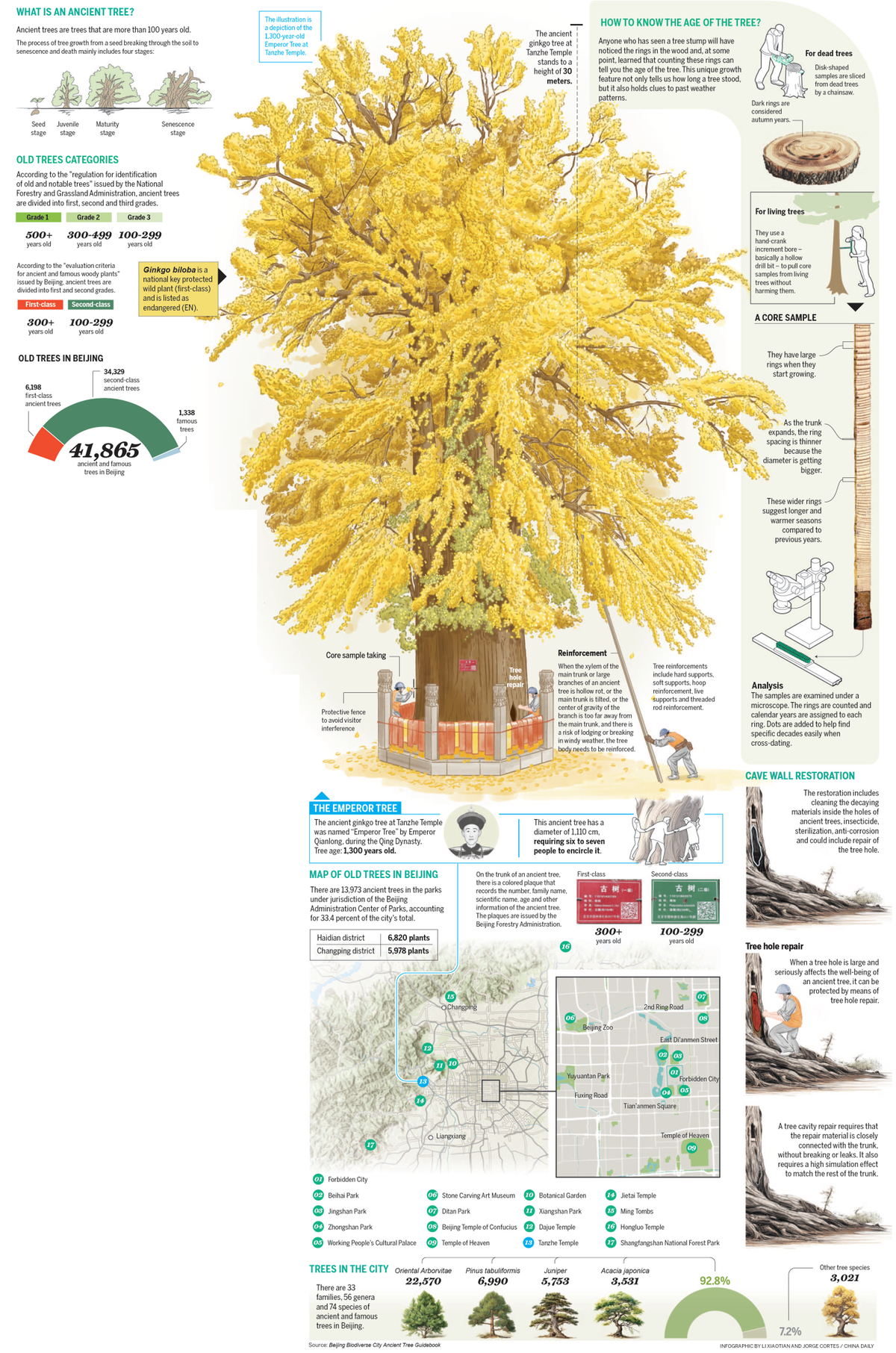Ancient tree guidebook published
Audi China launches publication stressing historical flora in Beijing


As you stroll through the streets and parks of Beijing, do you sense the watchful presence and quiet breath of ancient trees that have stood for centuries? Have you ever contemplated their fate?
With China's rapid urbanization, the harmonious integration of ancient tree conservation and urban development is becoming increasingly vital. "To achieve this goal, we need more urban residents to understand and actively participate in protecting ancient trees," said Yang Shutian, chairman of the Beijing Afforestation Foundation.
A survey reveals that Beijing is home to 41,865 ancient and valuable trees, of which 6,198(15 percent) are classified as first-grade ancient trees and 34,329 (82 percent) as second-grade ancient trees. First-grade ancient trees are more than 300 years old, while second-grade trees range from 100 to 299 years.
These natural treasures serve as more than mere green adornments for the city; they are steadfast witnesses to historical and climatic shifts and vigilant guardians of biodiversity.
The widths and patterns of tree rings can unveil past climate conditions, showcasing yearly fluctuations in rainfall and temperature. In warm and humid years, tree rings grow wider, while they become thinner during cold and dry periods. Extreme weather events also leave distinct marks on these rings.
A study published by Nature shows that 2023 was the hottest year recorded in the northern hemisphere over the past two millennia based on tree-ring analysis.
By reconstructing temperature records from tree rings, researchers at the Institute of Earth Environment, Chinese Academy of Sciences, have established a correlation between climate variations and historical trends in China.
The insights embedded in tree rings not only advance climate research but provide critical information for predicting future climate patterns, offering innovative solutions for addressing climate challenges.
Beyond their research significance, ancient trees play an essential role in maintaining the ecological balance and biodiversity. They fix significant amounts of carbon and positively influence the local microclimate.
Recently, Audi China and the Beijing Afforestation Foundation collaborated to launch the Beijing Biodiverse City Ancient Tree Guidebook, aimed at promoting awareness and understanding of ancient tree conservation. This initiative calls upon urban residents to take an active role in protecting the ancient trees around them.
The guidebook provides essential information about ancient trees, highlights notable specimens in Beijing, and includes a map featuring 17 scenic spots adorned with ancient trees. It also outlines methods for identifying and protecting ancient trees, with the overarching goal of preserving urban biodiversity.
"The launch of the guidebook serves as a concrete extension and interpretation of Audi's global 'Mission: Zero' program. At Audi China, we are committed to fulfilling our pledge to preserve biodiversity, recognizing it as an essential measure in taking action for a sustainable future," said Johannes Roscheck, president of Audi China. "Audi China Biodiverse City Initiative inspires people to protect biodiversity and build a green, beautiful and livable city."
Miriam Mayer-Ebert, executive vice-president of operation and transformation at Audi China, said: "This guidebook is designed for Beijing's urban residents, aiming to enhance people's understanding of ancient trees and guide readers toward a more scientific approach to viewing and protecting these natural treasures. We invite all nature lovers and environmental enthusiasts to join us in protecting urban biodiversity through practical actions."
The guidebook is supported by the National Forestry and Grassland Ancient Tree Health and Ancient Tree Culture Engineering Technology Research Center.


























